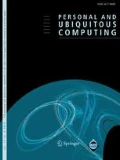Abstract
Ubiquitous computing technologies are slowly finding their way into commercial information systems, which are often constructed at considerably larger scale compared to what is possible in research demonstrators. Furthermore, lengthy and costly preparation or upgrade of existing infrastructures, training of employees and users in the new ways of working, controlled introduction of new functionality, features and services to manage risk, unexpected behaviors due to the wider variety of possible real-world situations, incremental approach to systems development so as to better identify successful aspects, regard for the economics of systems as a core requirement, and selection of open or closed systems are all issues that are mostly outside the scope of current ubiquitous computing research but play a critical role in industrial deployments. In this paper we review two case studies of fully operational Radio Frequency Identification-based systems: the Oyster card ticketing system used at the London Underground in the UK, and retail applications deployed at the Mitsukoshi departmental stores in Tokyo, Japan. We examine each case in terms of technologies, user interactions, and their business and organizational context and make several observations in each case. We conclude by drawing general lessons related to ubiquitous computing in the real world and identify challenges for future ubiquitous computing research.




Similar content being viewed by others
References
Alessandro A (2004) Security of personal information and privacy: technological solutions and economic incentives. In: Camp J, Lewis R (eds) The economics of information security, Kluwer, Dordrecht
EPCglobal (2006) EPCglobal Inc. Home Page. http://www.epcglobalinc.org/
Günther O, Spiekermann S (2005) RFID and the perception of control: the consumer’s view. Commun ACM 48(9):73–76
Group Transport Planning and Policy (2005) London Travel Report 2005, Transport for London
Lingo L, Orrick P, Smith L (2005) Fare payment technologies, California Center for Innovative Transportation UC Berkeley
METI (2006) Overview of METI RFID Tag popularization policy. http://www.meti.go.jp/english/information/data/IT-policy/ic-tag.htm
MIC and METI (2004) Guidelines for privacy protection with regard to RFID tags. http://www.meti.go.jp/english/information/data/IT-policy/ic-tag.htm
Mitsukoshi (2005) Mitsukoshi home page. http://www.mitsukoshi.co.jp/
Roussos G, Moussouri T (2004) Consumer perceptions of privacy, security and trust in ubiquitous commerce. Personal Ubiquitous Comput 8(6):416–429
Acknowledgments
We would like to thank Brian Dobson of the Prestige project at Transport for London and Masakazu Nishida of Mitsukoshi, Ltd. for providing access to the projects and for several discussions that provided a wealth of information. We would also like to thank Mikako Ogawa, Masaki Umejima, and Jiro Kokuryo of Keio University for providing useful information and generous assistance in setting up the Mitsukoshi case study.
Author information
Authors and Affiliations
Corresponding author
Rights and permissions
About this article
Cite this article
Konomi, S., Roussos, G. Ubiquitous computing in the real world: lessons learnt from large scale RFID deployments. Pers Ubiquit Comput 11, 507–521 (2007). https://doi.org/10.1007/s00779-006-0116-1
Received:
Accepted:
Published:
Issue Date:
DOI: https://doi.org/10.1007/s00779-006-0116-1




